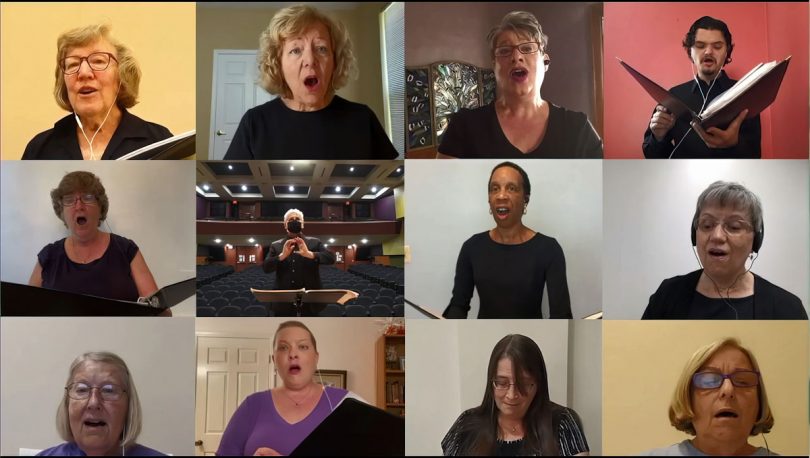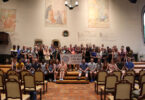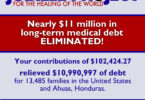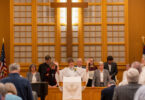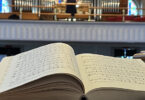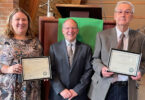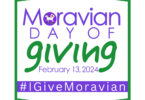Since 1950, Moravian musicians have gathered at Moravian Music Festivals to worship, be in fellowship, share experiences and knowledge, learn from others, and celebrate the gift of Moravian music. There have now been 26 Moravian Music Festivals in North America, planned and managed by thousands of volunteers, in Winston-Salem, N.C. and Bethlehem, Pa., but also in Lancaster Co. (Pa.); Columbus and Tuscarawas Co. (Ohio); Madison (Wis.); and Edmonton (Alberta, Canada).
This year was different.
The 26th Moravian Music Festival was initially scheduled to take place in Bethlehem (in person) July 18 – 24, 2021. With the pandemic, however, the planning committee was forced to decide by late fall of 2020, whether or not singing and playing together would be safe by the summer of 2021. Out of an abundance of care and caution, it was determined that the July 2021 Festival should be held completely online, and maximize the capabilities and benefits of technology.
The committee also decided to divide the 26th Festival into two parts: an online Part 1 (July 18-24, 2021), and an in-person Part 2 (July 26-30, 2022) which will be held in Bethlehem, Pa. (Registration for Part 2 will go live in late fall of this year.)
Maximizing Technology
Making the Festival happen required applying new techniques to sharing the music. In 2021, the programs and sessions of the Moravian Music Festival focused on learning and sharing using video and online platforms. In addition, social time was provided, via online conferencing, to connect Festival participants with one another and share in fellowship. Both of these approaches allowed for participation from many states and several different countries.
A robust website kept all the resources, links and instructions organized for participants. Each day, registrants received an email with links to the sessions, social gatherings, and concerts. While we did forgo the banal totebag, registered musicians received an envelope of fun swag (stuff we all get) and had the option to purchase a Festival t-shirt.
A complete musical week had been planned for an in-person festival by MMF Director and Assistant Director, the Rev. Dr. Nola R. Knouse and Gwyneth Michel. They selected anthems and hymns, invited musicians, and created music for children. Most of these plans survived the switch to an online Festival, and will advance to next summer’s Festival in Bethlehem.
The main disadvantage of the online Festival was the inability of any of the ensembles to rehearse together. We re-focused our efforts toward creating “virtual” band and “virtual” choir videos; these became our greatest challenges. They required syncing up audio and video of individual voices or instruments, recorded at different places and times, into a cohesive ensemble.
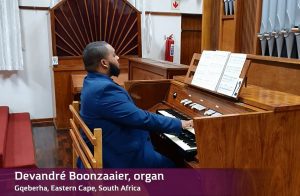
First, recordings had to be produced for each piece and each vocal part, with count-offs and clicks for the musicians to follow. Then, a conducting video was married to the audio. Each musician then practiced their individual part, and finally recorded themselves, following the audio and conducting tracks as they played or sang. Many found this to be much more challenging than staying with an ensemble and conductor in real time.
Thanks to our musicians for making their own wonderful recordings, and especially to our virtual video and audio editors, Jacob Patrick, Sean Devlin and Seth Frack who produced the final videos. We also had expert assistance from the team at Rollins College (Dr. John V. Sinclair) in making the choir rehearsal tracks, instrumental tracks, and performing and recording Mary Wilson’s recital. The excellent results of the virtual bands and choirs may be heard and seen in the Friday evening service of music, now available online (see information at the end of this article).
Soli Deo Gloria
Concerts have always been a main focal point of Festival, allowing us to share our talents and treasures with the community, for the glory of God. The Sunday and Friday evenings were live-streamed and took the form of a Singstunde (a service of word and music) with both live and recorded elements. These services were planned beautifully by Festival Chaplain, the Rev. Melissa Johnson, and presented over Zoom with the help of IBOC Executive Director, Mike Riess. The Monday through Thursday evening concerts were pre-recorded and premiered each night, opening with devotions and a musical prelude. The weekday concerts and preludes were produced by Erik Salzwedel and incorporated recordings from over 60 ensembles, representing hundreds of Moravian musicians worldwide.
If you have not yet watched the Festival concerts, you owe it to yourself and your soul to do so. These are available free to the public and can be found on the Festival YouTube Channel.
- Sunday, July 18: Opening Worship, Christian Hearts in Love United; a Singstunde, featuring speakers/readers from around the world;
- Monday, July 19: I Have Chosen You, featuring Mary Wilson, soprano, and musicians of the Bach Festival Society of Winter Park (FL); John Sinclair, conducting;
- Tuesday, July 20: Pipes and Pedals, featuring 9 organists from 4 countries, and including 5 Tannenberg organs from around the Moravian world;
- Wednesday, July 21: Summer Serenade, music for smaller forces – vocal and instrumental;
- Thursday, July 22: Resounding Joy, brass ensemble and solo music from around the world;
- Friday, July 23: Service of Word and Music, We Are Members of Christ’s Body; a service featuring nine virtual band and chorus videos made by Festival participants.
Exploring new music
The Moravian Church is blessed with many composers writing new anthems and songs. Recent publications have celebrated contemporary song- and hymn-writing, such as, Sing to the Lord a New Song and the red (contemporary) series of MMF’s Moravian Star Anthems. The Festival session, Worship Ensembles Today was convened by Rev. Dr. C. Riddick Weber and explored the opportunities to collaborate and present quality worship music in new and creative ways.
That session is also an example of the advantages afforded by technology, i.e., being able to convene a panel of musicians with a variety of experiences, in one place, viewable by anyone, in any place, on any device. This ability to include panelists from far and wide was experienced with our choir director, band director, and Making Music with Children panels. David Blum’s Moravian Musicology Today session included researchers from around the world and introduced us to a wealth of perspectives in musicology and the Moravians! The Music of the Bach Family, a second video by MMF Research Librarian, David Blum, is further testament to the advancing technical and creative capabilities of the MMF staff.
A team effort
Bringing the 26th Moravian Music Festival to life required the work – and flexibility – of many people.
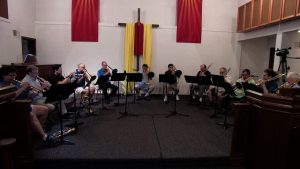 The staff of the Moravian Music Foundation – Rev. Nola R. Knouse, Gwyneth Michel, Erik Salzwedel, Sarah Durham – moderated the sessions and social hours, while Hanna Cheek Jackson of the Board of Cooperative Ministries, handled the technical side: hosting the webinars and connecting us all through Zoom. The trustees of the Moravian Music Foundation created and contributed devotions, music, and video content and were both moderators and experts in sessions and webinars.
The staff of the Moravian Music Foundation – Rev. Nola R. Knouse, Gwyneth Michel, Erik Salzwedel, Sarah Durham – moderated the sessions and social hours, while Hanna Cheek Jackson of the Board of Cooperative Ministries, handled the technical side: hosting the webinars and connecting us all through Zoom. The trustees of the Moravian Music Foundation created and contributed devotions, music, and video content and were both moderators and experts in sessions and webinars.
Myra Jones and Sarah Hriniak kept our youngest participants engaged online as they learned songs and dialogue from the musical theater production, ACTS. They shared some fun social time and enjoyed the Instrument Zoo, crafts, games, coloring, word search, and crosswords. The Rev. Dr. Lynnette Delbridge hosted Zoom youth gatherings, connecting teen-aged Moravians from across the provinces.
The Board and staff of MMF and the Festival Planning Committee would like to express their deepest and most sincere appreciation to the many worship leaders, educators, and musicians from around the world who recorded themselves, edited, uploaded and shared their music with us all.
We enjoyed submissions of music videos from South Africa, Nepal, the Netherlands, Germany and several states. In return, and as evidence of our growing worldwide connections and relationships, many North American Moravian band players submitted video to the Brass Band Union of South Africa for their 70th Anniversary Festival in October!
Looking Ahead
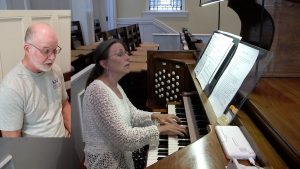 While we all missed the close fellowship and musical collaboration of past Festivals, we enjoyed long distance connections that may have been impossible otherwise. An online Festival eliminates many of the barriers to participation, such as time off work, time away from family, and travel. Over 100 registered for the Festival, participating in the sessions, webinars, virtual music projects and social times. Beyond that, public viewing of the concerts and services was in the thousands during Festival week.
While we all missed the close fellowship and musical collaboration of past Festivals, we enjoyed long distance connections that may have been impossible otherwise. An online Festival eliminates many of the barriers to participation, such as time off work, time away from family, and travel. Over 100 registered for the Festival, participating in the sessions, webinars, virtual music projects and social times. Beyond that, public viewing of the concerts and services was in the thousands during Festival week.
The MMF staff and the local Festival Planning Committee, led by Hank Naisby, are already planning and making arrangements with Moravian University, Central Moravian Church, and other entities for the in-person Festival, Part 2, July 26-30, 2022. For now, the registration site is set up for the Access Pass to the 2021 content. By the end of this year, you will be able to register for Part 2 at www.moravianmusicfestival.org
The Festival Committee requests financial support from those who value Moravian music and want to encourage participation, especially by younger musicians. You may give to the Festival Scholarship Fund and the Children’s program (which is free to participants). Underwriting, sponsorships, and donations of any amount are invited. www.moravianmusicfestival.org/contribute/
Erik Salzwedel is business manager for the Moravian Music Foundation and was instrumental in bringing the 26th Moravian Music Festival to life. To learn more and revisit Part I of the Festival, visit
www.moravianmusic.org/the-26th-festival-part-1/

